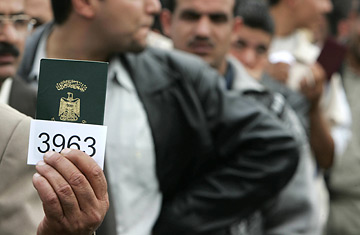
Iraqi refugees wait to be processed at the United Nations High Commissioner for Refugees (UNHCR) in Syria.
Among the millions of Iraqis who have fled their homeland, there are about 10,000 who have been designated "persecuted" by the United Nations. Most of these have earned that label because they worked for the U.S. military or American organizations and have been forced to flee Iraq for safety amid threats from insurgents and other enemies of the U.S. But their path to the U.S. has been inordinately complicated, and a new Senate bill, expected to pass this week, is aimed at removing many of the hurdles. To understand how, consider the case of a 22-year-old former translator whom we'll call Mohammed.
He has been in Syria for more than a year waiting to be processed. It has been a year in which he has been homeless and jobless. His story has been confirmed by three people who are trying to bring him to the states: a U.S. army sergeant who worked with him in Iraq; a pro bono lawyer; and the head of PEN American Center, a writer's group devoted to freedom of expression. "We owe it to him," says Sergeant Joe Seemiller, for whom Mohammed worked as an interpreter in Mosul. "He aided us in what we were doing. The guy deserves to be here as much as I do."
In January 2004, Mohammed, who was fresh out of college, went to work for the Second Infantry Division. A student of English, he was assigned to a forward operating base in the northern city of Mosul, translating for soldiers at a guard tower surrounded by walls regularly targeted by insurgent snipers and mortar attacks. Seemiller credits him with saving many American lives by calming down crowds throwing rocks and trying to scale the walls.
When interpreters were singled out as collaborators by the insurgency, the sergeant urged Mohammed to quit his job. But Mohammed pledged to serve as long as he possibly could and stayed longer than other Iraqis. "The guy is more patriot than most of the soldiers I work with," says Seemiller.
But the threats against Mohammed continued, coming in anonymous phone calls and then, his sponsors say, in a car of armed men parked outside his home. Mohammed's army buddies were unable to protect him or even facilitate a visa while Mohammed was in Iraq. So, in September 2004, after a written death threat was delivered to his parents' home, he went into hiding. Insurgents kept up the hunt, telling family and friends who had harbored Mohammed that he was on an assassination list.
In July, 2006, after a relative was shot in the head, Mohammed fled across the border to Syria. That was the only way he could facilitate a visa, needing to leave Iraq in order to get a referral by the U.N. High Commissioner for Refugees (UNHCR). Once Mohammed was in Syria, the UNHCR made a legal determination that he was a victim of political persecution and referred his case to U.S. authorities. But he has waited months to hear from interviewers from the Department of Homeland Security — who have been denied visas by the Syrian regime.
The measure approved by the Senate last Thursday night would sweep away many hurdles that made survival so difficult for Mohammed and other refugees who have worked for the U.S. government, contractors, media and private organizations in Iraq. If it becomes law, it would allow them to apply directly to U.S. authorities in Iraq, bypassing the U.N. referral process outside the country. If the law had been in place, Mohammed would have avoided the time he lost on the lam in Iraq. There would have been no need to flee to Syria to win the "persecuted" status. For those who do wind up in places hostile to America, the legislation would allow for teleconferencing — thus avoiding the problem of unfriendly governments like Syria that deny visas to U.S. officials. (Aside from being employed by American interests, applicants would have to prove a "well-founded fear of persecution.")
Sponsors of the measure, led by Ted Kennedy, attached it to the huge defense authorization bill that is expected to pass this week. The bill will still need approval by the House-Senate conference committee before enactment and presidential signature. And even if it becomes law, there are limits to how many Iraqis can find new homes in America. The State Department has set a ceiling on the number of refugees that the U.S. can take in from each region of the world — 28,000 from all of the Near East this year. That quota is not altered by the legislation.
The odds are, however, that Mohammed would be among the first to benefit.
